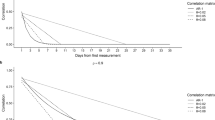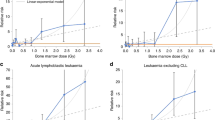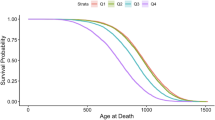Abstract
THE increase in age-specific chronic mortality rate that occurs after a single whole-body exposure to ionizing radiation has been commonly used as a parameter of ageing1. Whether or not the increase occurs immediately or only after a latent period is not known, owing to the fact that experiments are customarily initiated with young animals, for example, 50- to 125-day-old mice. The mortality rate is then so low that not even a large relative increase can be significantly established in groups of 50 animals.
This is a preview of subscription content, access via your institution
Access options
Subscribe to this journal
Receive 51 print issues and online access
$199.00 per year
only $3.90 per issue
Buy this article
- Purchase on Springer Link
- Instant access to full article PDF
Prices may be subject to local taxes which are calculated during checkout
Similar content being viewed by others
References
Comfort, A., Radiation Res., Suppl. 1, 216 (1959).
Kohn, H. I., Kallman, R. F., Berdjis, C. C., and DeOme, K. B., Radiation Res., 7, 407 (1957).
Kohn, H. I., Radiation Res., Suppl. 1, 235 (1959).
Author information
Authors and Affiliations
Rights and permissions
About this article
Cite this article
KOHN, H., GUTTMAN, P. Latent Period of X-Ray Induced Ageing: a Study Based on Mortality Rate and Tumour Incidence. Nature 184, 735–736 (1959). https://doi.org/10.1038/184735a0
Issue Date:
DOI: https://doi.org/10.1038/184735a0
This article is cited by
-
Preleukemic change in the bone marrow of whole-body irradiated RFM/up mice
Research in Experimental Medicine (1977)
-
Zur Frage der Erholungsvorg�nge bei Dauerbestrahlungen von Versuchstieren mit R�ntgenstrahlen
Biophysik (1967)
-
Ageing and Radiation
Nature (1960)
Comments
By submitting a comment you agree to abide by our Terms and Community Guidelines. If you find something abusive or that does not comply with our terms or guidelines please flag it as inappropriate.



